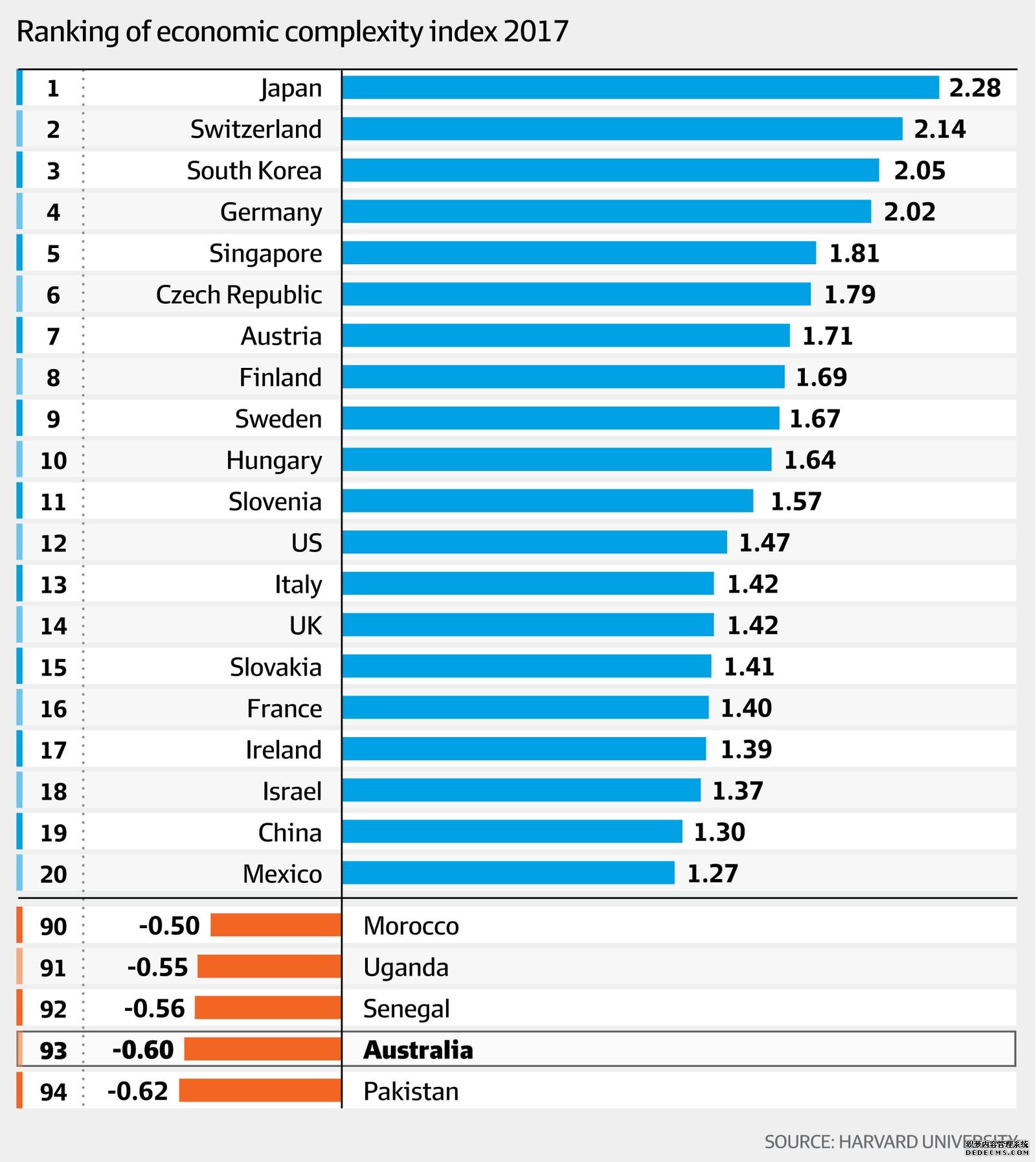这文章说的是澳洲经济体复杂度。文章认为复杂度高竞争力强。那张图挺有意思的。
Australia is rich, dumb and getting dumber
All are among the economies that are so lacking in complexity, and have such limited natural opportunities to develop new products, that Harvard University recommends they adopt industrial policy straight out of the post-colonial developing world: the "strategic bets" approach.
https://www.afr.com/policy/economy/australia-is-rich-dumb-and-getting-dumber-20191007-p52y8i

评论
本来就不是制造业和创新国家,没必要让游泳健将参加乒乓球比赛
评论
不是付费群众,看不到原文
评论
别事不关己高高挂起。
这文章也许对坛子里那些换了国籍,扎根在这里,准备67岁拿养老金的人会产生长期财富积累和年老时老年人社会福利的影响的
评论
文章很有意思。观点独特。
个人觉得,澳洲经济就两个点:铁矿出口,农产品出口。
Australia is rich, dumb and getting dumber
Aaron PatrickSenior Correspondent
Bangladesh, Cuba, Iran, Mali and Turkmenistan share an unexpected connection to Australia, and it isn't membership of a tourist destination hot list.
All are among the economies that are so lacking in complexity, and have such limited natural opportunities to develop new products, that Harvard University recommends they adopt industrial policy straight out of the post-colonial developing world: the "strategic bets" approach.
The advice comes from the Harvard Kennedy School's Center for International Development, which two weeks ago launched an online database of 133 economies that combines remarkably rich data with beautiful presentation.
Designed to map, literally, the economic progress and opportunities of the industrial and non-industrial world, the Atlas of Economic Complexity exposes an under-appreciated truth about Australia.
The enormous wealth generated by iron ore, coal, oil and gas masks, and probably contributes to, an economy that has failed to develop the industries needed to sustain its position among the top ranks of the developed world.
Put simply, Australia is rich and dumb, and getting dumber.
On the primary metric used in the database, an index of economic complexity, Australia fell from 57th to 93rd from 1995 to 2017, a decline that is accelerating. Australia's top trading partner, China, rose from 51st to 19th over the same timeframe.
The Australian paradox
The index measures the diversity and sophistication of national exports, based on research by Harvard economist Ricardo Hausmann that finds trade in a globalised world is the path to riches.
Harvard economist Ricardo Hausmann finds Australia is part of a group of simple economies that should adopt policies that single out specific industries for support.
The Harvard data exposes the paradox of the Australian economy: the eighth-richest nation in the study has the export profile of Angola.
About 70 per cent of products sold to foreign buyers, on a net basis, are minerals and energy. Add in food, alcohol, wool, tourism and metal products, and the figure rises to around 99 per cent.
Notwithstanding the success of CSL, Atlassian and corporate pioneers, Australia sells the world almost nothing, relative to total exports, that requires a degree to make.
"Australia is less complex than expected for its income level," the study says. "As a result, its economy is projected to grow slowly."
As a consequence, the economy will grow 2.2 per cent a year over the coming decade, ranking in the bottom half of countries globally, according to the Harvard projections.
Countries can do very well selling a narrow range of simple products. But to become richer – and end the wage-growth malaise that is a frequent political complaint – they need to develop new products. More sophisticated products support higher wages, according to Harvard's Center for International Development.
Innovation deficit
Lulled into inaction by the resources boom, Australia has been appalling at innovation.
In the 15 years to 2017, Singapore – a nation with no natural resources apart from human capital and proximity to big markets – expanded into 19 new global industries that generated $US14.4 billion ($21.3 billion), or $US2560 per resident. They include gas turbines, x-ray machines, synthetic rubber and imitation jewellery.
Over the same period, Australia broke into seven new products in a meaningful way, according to the Harvard database: precious metal ores, ammonia, rare earths, activated carbon, hydrochloric acid, scrap rubber and wax residues.
The value per Australian: $US33.
The most remarkable, and damning, conclusion of the research is that Australia is part of a group of simple economies that should adopt policies that single out specific industries for support.
Countries that many Australians would regard as economic peers, including Japan, Israel and the US, are on the frontier of technology and should be developing products that don't currently exist, it says.
Product proposals
For Australia, the study proposes a couple of dozen exports based on research that suggests, logically, leaps are easier when you manufacture similar products, such as moving from woollen socks to business suits.
The suggestions include serums and vaccines, laboratory reagents, vehicle bodies, butter, frozen vegetables, pig fat, chemical wood pulp and linseed.
So much for innovation nation.
Even if the suggestions are overly pessimistic, they point to Australia's struggle to break into international markets beyond resources and agriculture.
Despite being a preoccupation of both main political parties, industry policy has done little to improve the economy's sophistication.
As the government manages the current downturn, it might muster the courage to remove barriers that make it harder for business to thrive.
After all, surely an advanced economy such as Australia can do better than Senegal, which is one rank higher on Harvard's list?
评论
主要靠资源。天然气还有空间,铁矿空间有限,而且很快有新的竞争者。
评论
全球化的作用显现而已
低端门类的制造业就算了
评论
澳洲去年和今年依靠巴西洪水,铁铜等矿石赚了一波红利,帮助政府减少了几十亿的亏空。
南美和俄罗斯已经为中美贸易战增产,澳洲的主要出口品种农产品和铁矿石都将受到这些国家的竞争。
如果中国减缩对澳洲的旅游和留学人数,澳洲经济增长将会降到1%以下。
评论
想对土澳正虎说:虽然你家里有矿,但是对待你最大的客户中国也得长点心,不能像现在这么作死.要不就等着明年继续降息QE仆街吧.
评论
已经是全世界最好的国家了,要那么多钱干什么
评论
为后代着想就要跟上脚步,世界格局在变化。
评论
这么想挺好的,每天都开心
澳洲中文论坛热点
- 新西兰总理:出世在新西兰的新纳粹Thomas Sewell是“挺蹩脚的人”,但那是澳洲的问题
- 新西兰总理拉克森称新纳粹Thomas Sewell是坏人,但是没对要求把他从澳大利亚遣返到诞生国去的呼吁置评。
- 撞穿学校栅栏害死十一岁男孩的司机不必坐牢
- 一位女司机撞穿学校栅栏、害死了11岁男孩,被罚2000元罚金、撤消驾照,不必坐牢。Jack Davey 的父母去了